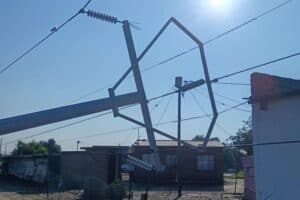The hikes in the prices of fuel and electricity also pushes up the cost of everything else.

South African consumers are at breaking point due to fuel and power prices, exacerbated by the return of higher stages of load shedding. They now pay more than R24 per litre for fuel on top of the much-protested July electricity price hike that caused country-wide protests over the past two months.
Stage 5 and 6 load shedding implemented ‘until further notice’ is further severely disrupting the lives and livelihoods of South Africans and their businesses. The country is on tender hooks, a ticking time bomb ready to explode.
Despite Minister of Electricity Kgosientsho Ramokgopa stating that he is “concerned about the current load shedding stage 5 and is in constant contact with the leadership of Eskom’s generation team to ensure that units are returned to service as speedily as possible,” there has been no commitment about when this will happen.
Eskom’s electricity tariffs increased by around 450% since the start of load shedding in 2008 due to poor management, rising costs, declining demand and runaway debt, outstripping inflation substantially, according to an economic bulletin written by economists Zaakirah Ismail and Christopher Wood and published by the South African Reserve Bank (Sarb).
ALSO READ: One in three South Africans cannot pay their bills – survey
Deep concern about financial onslaught
Neil Roets, CEO of Debt Rescue, is deeply concerned that consumers are at breaking point under the financial onslaught from South Africa’s two largest energy sources powering the economy and the fact that authorities are simply ignoring the writing on the wall.
“There absolutely has to be some respite for consumers soon and this needs to come in the form of financial relief from Eskom and the Department of Mineral Resources and Energy. The financial tsunami emanating from these quarters is wreaking havoc on the lives of people across all income brackets, who are paying the price for maladministration, bad management and corruption.”
The department says the steep increase in the price of both petrol grades (R1.71 per litre) is due to an increase in the average Brent crude oil price, from $79.75 a barrel to $84.78 over the past month due to production cuts by Saudi Arabia.
“High fuel prices are a result of low inventories and refinery outages, which affected the production of blending components used in summer grade petrol making it more expensive to produce,” the department said.
However, Roets says this is cold comfort to the millions of South African motorists who will now have to pay R24.54 per litre for 95 unleaded petrol and R24.14 for 93, not to mention commuters who will undoubtedly be hit with a steep hike in taxi and bus fares. For motorists filling up with diesel, the news is even worse, with the wholesale price of diesel increasing by a painful R2.84 per litre.
The Automobile Association (AA) has warned that the fuel price increases will have negative consequences for all consumers, not just motorists, as the higher transport costs will inevitably filter through to general inflation.
ALSO READ: Load-shedding & fuel hike: Here’s how much more you’ll pay to keep your generator running
Higher fuel prices lead to higher prices for everything
“Motorists will certainly feel the pinch in terms of higher fuel prices at the pumps but consumers across the board can expect higher prices for all goods and services due to these hikes,” the AA says.
The AA also calls for urgent intervention in the RAF levy, which currently comprises R2.18 on every litre of petrol and diesel sold in the country.
The RAF secures around R42 billion in funding annually through the RAF levy on fuel, but citizens derive little benefit from their contributions.
Roets agrees that a major repercussion of the petrol price hike is that it will inevitably drive up inflation and put even more pressure on consumers.
Hugo Pienaar, chief economist at the Bureau for Economic Research (BER) also agrees, saying that the outsized fuel price increase will affect inflation. “With outsized South African fuel price hikes in September, headline and core CPI are set to diverge again in coming months,” he warns.
Roets says the country is locked into a vicious cycle that can only spell financial disaster for the average South African. “We see more people across the income spectrum relying on credit to get them through the month. There is also an increase in people defaulting on their debt.”






